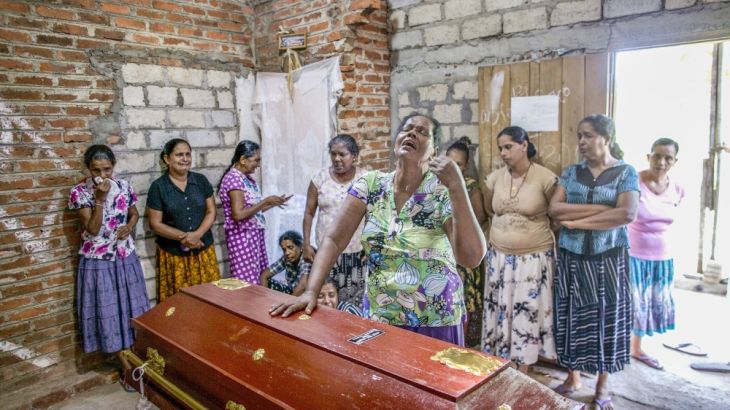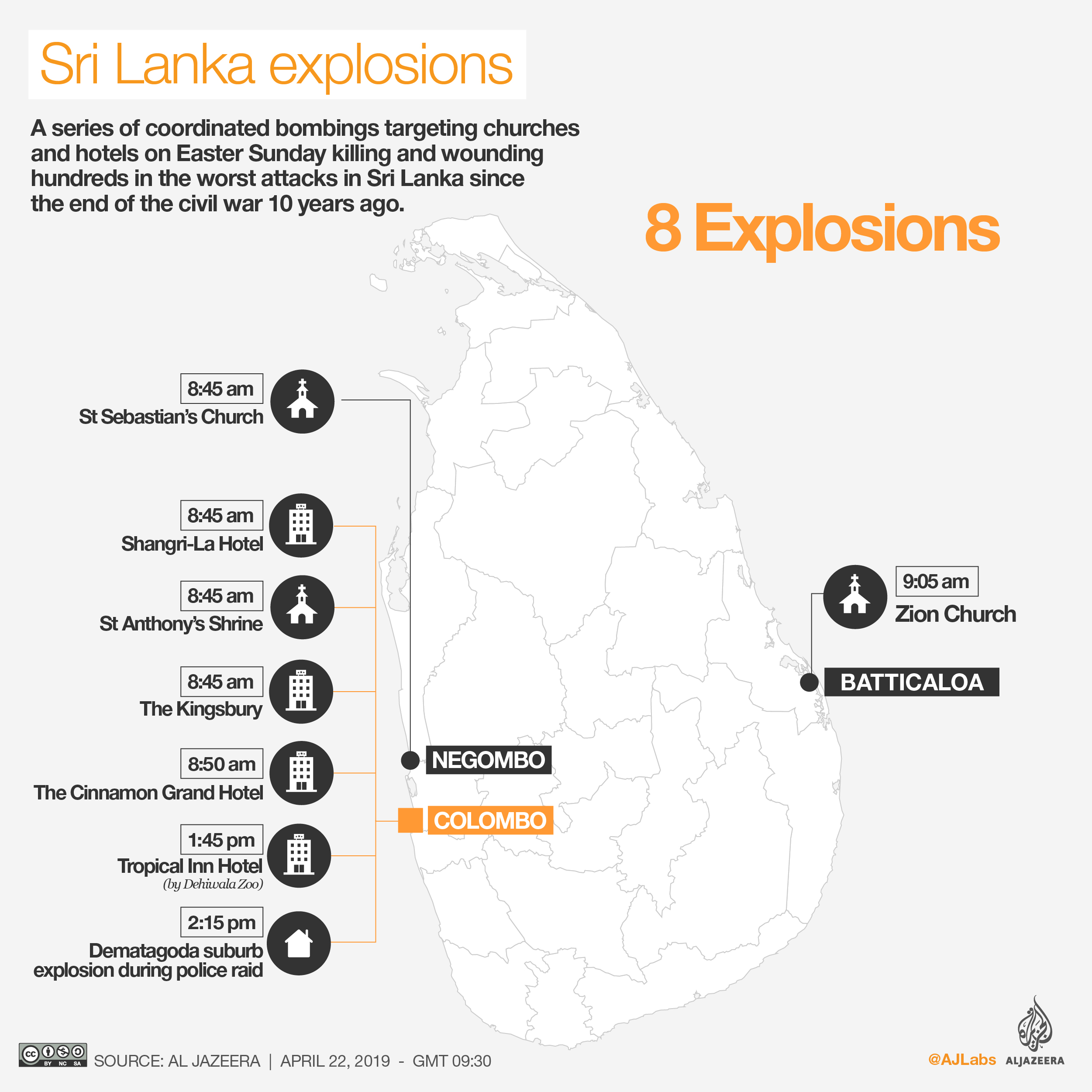Hardline local group linked to deadly Sri Lanka attacks
Minister points the finger at a little-known Muslim organisation as security analysts suggest international ties.

A local Muslim group in Sri Lanka has been linked to the string of bombings that killed nearly 300 people and wounded 500 others in coordinated attacks on Easter Sunday that have shocked the country.
Health Minister Rajitha Senaratne on Monday blamed President Maithripala Sirisena’s government for failing to act on intelligence on the group shared weeks before the multiple blasts, which targeted churches and luxury hotels across the South Asian island nation.
Keep reading
list of 4 itemsSri Lanka to probe allegation of intelligence complicity in 2019 bombings
Protest in Sri Lanka on fourth anniversary of Easter bombings
Sri Lanka ex-leader ordered to compensate Easter bombing victims
Speaking at a press conference in the capital Colombo, Senaratne said the failure to act against National Thowheed Jamath, a hardline Muslim organisation in Sri Lanka, had devastated the entire country.
He said on April 4, foreign intelligence agencies passed on information that “such an incident will take place in this country” involving “suicide bombers”.
“In those detailed reports, they have said that the targets are the Christian and Catholic churches, and also the tourist destinations, hotels,” said Senaratne.
On April 9, the defence ministry wrote to the police chief with intelligence that included the group’s name. On April 11, the police wrote to the heads of security of the judiciary and diplomatic security division, Senaratne added.
“Unfortunately, despite all these revelations by the intelligence units, we could not avert these attacks,” said Senaratne, also the cabinet spokesman. “We are responsible. We are very sorry and we apologise to everybody.”
Cardinal Malcolm Ranjith, the archbishop of Colombo, said the attacks could have been thwarted.
“We placed our hands on our heads when we came to know that these deaths could have been avoided. Why this was not prevented?” he said.
Foreign support?
Senaratne also hinted at a possible role of an international network in the Easter Sunday attacks.
“We don’t see that only a small organisation in this country can do all that,” Senaratne said of the devastation. “We are now investigating international support for them and their other links – how they produced the suicide bombers and bombs like this.”
No group has claimed responsibility for the carnage so far.
Two leading Muslim groups issued statements condemning the attacks, with the All Ceylon Jamiyaathuul Ulama, a council of Muslim theologians, urging the “maximum punishment for everyone involved in these dastardly acts”.
Fears of further attacks in Sri Lanka have been raised.
A US State Department travel advisory warned of the danger of “terrorist groups” plotting more attacks. Targets could include tourist locations, transport hubs, shopping malls, hotels, places of worship and airports.
Other governments, including Japan and Australia, have also cautioned citizens planning travel to the country.
|
|
‘Operational capability’
Analysts said the targeting of churches and hotels where foreign tourists stay in Sri Lanka was a “new and worrying development” in the predominantly Buddhist country.
Some observers noted the attacks bore the hallmarks of those carried out previously by al-Qaeda and Islamic State of Iraq and the Levant (ISIL).
“These synchronised attacks are out of the ordinary for Sri Lanka. Compared with similar attacks in the Middle East and Southeast Asia, it has the DNA of attacks carried out by Islamic State and al-Qaeda,” said Alto Labetubun, an anti-terrorism analyst who has researched the two groups for a decade.
A senior Asian counter-terrorism official, who declined to be identified, told Reuters news agency the attack was likely carried out by a group with “significant operational capability and skilled commanders”.
Four of the bombs went off at roughly the same time at 8.45am, with two others coming within 20 minutes.
Two other explosions rocked Colombo in the afternoon. Authorities later found unexploded devices and a van full of explosives in various locations.
![Relatives of victims react at a police mortuary after Sunday's bomb blasts [Dinuka Liyanawatte/Reuters]](/wp-content/uploads/2019/04/38aabcccb7144967b10d8fd5b372c6a6_18.jpeg)
Sunday’s attacks marked a shift to churches and places associated with Western interests, analysts said.
The violence was the worst the country has witnessed since the 26-year civil war between ethnic Tamil separatist rebels and government forces ended in 2009, when deadly bomb blasts were common in Colombo and other cities.
More than 100,000 people were estimated to have been killed in the decades-long fighting.
The history of conflict means it was possible the perpetrators of Sunday’s attacks had access to weapons and explosives, but it was also likely that foreign actors were involved, experts said.
“With this scale of attacks, I don’t think this was only carried out by locals. There is most likely involvement of foreign groups or people, including people moving in and out of India or Pakistan,” said Labetubun.
Pratyush Rao, South Asia analyst at the Control Risks consultancy, said it was unlikely there were any direct ISIL ties to the bombings.
“While the scale and sophistication of the attacks suggest an overseas link, there does not appear to be any evidence so far to link it directly to ISIL,” Rao said.
“It is plausible though that the attacks may have been inspired by ISIL tactics and ideology.”
‘Blame game’
Health Minister Senaratne’s criticism of President Sirisena, who heads the security forces, comes a day after Prime Minister Ranil Wickremesinghe acknowledged “information was there” about possible attacks.
Ties between the two leaders are at an all-time low following Sirisena’s sacking of Wickremesinghe in October. The move triggered a weeks-long political crisis that ended only when the Supreme Court overturned that decision.
Opposition member of parliament Namal Rajapaksa told Al Jazeera that Wickremesinghe and his cabinet shouldn’t be playing a “political game” over the attacks.
“We are shocked to hear that the prime minister is claiming that he wasn’t aware of the security threat and of course trying to play the initial blame game and put the blame on to the president or the armed forces. This is not acceptable,” said Rajapaksa.
There were fears the attacks could spark a renewal of communal violence, with police also reporting late on Sunday there had been a petrol bomb attack on a mosque in the northwest and arson attacks on two shops owned by Muslims in the west.
Christians, Muslims and Hindus form nearly one-quarter of the island’s 23 million population.
